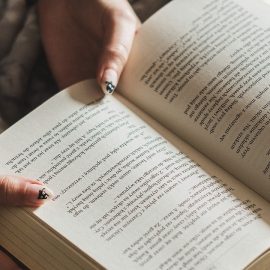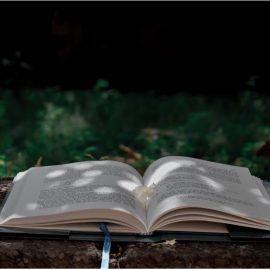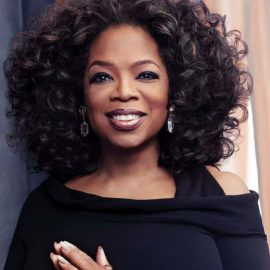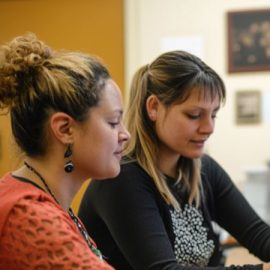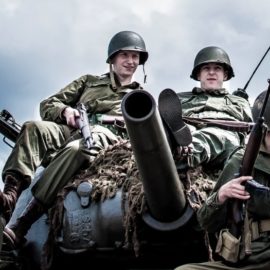
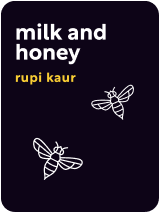
This article is an excerpt from the Shortform book guide to "Milk and Honey" by Rupi Kaur. Shortform has the world's best summaries and analyses of books you should be reading.
Like this article? Sign up for a free trial here .
Are you trying to learn more about the milk and honey poems in Rupi Kaur’s collection? What are the key messages in her poetry collection?
Rupi Kaur’s milk and honey poems explore the formative experiences in Kaur’s life. She discusses issues of oppression, love, heartbreak, and healing.
Keep reading for key concepts from the milk and honey poems.
Milk and Honey Poems
Rupi Kaur experienced oppression and abuse throughout her life. From an uncle who raped her as a child to a father who demanded she stay silent, she grew up in an environment that taught her she was worthless. However, as she grew up, her experiences with love and heartbreak taught her how to find the beauty in herself and how to heal in the face of painful experiences.
(Shortform note: This summary of milk and honey poems has been written to be as objective as possible. However, poetry naturally lends itself to individual interpretation. This summary is one interpretation of the work’s themes and isn’t meant to be definitive.)
Abuse and Oppression
Kaur compares her journey through childhood to someone pinning her legs to the ground then demanding she stand. She felt as though people expected a lot from her while actively working against her instead of supporting her. Throughout her childhood, she experienced the fallout of a distant father, gender oppression, and sexual assault.
A Distant Father
Kaur states that your father is supposed to be the first man you love, but that she didn’t have that experience because she never connected to her father. When they would speak, her father often screamed at her. He claimed this was out of love, but this confused Kaur. She began to associate love with aggression. In fact, she began to develop angry tendencies like those of her father.
Gender Oppression
Growing up, Kaur and her mother were told to be silent. Any time Kaur would try to speak up, her father and other men in her life would shut her down. Because she was told to stay silent, Kaur began to view herself as unimportant. She would look at herself in the mirror and tell herself that she was nothing.
Sexual Assault
As a child, Kaur was raped by her uncle. She recalls her assault in graphic detail. For a while, her trauma led her to feel unsafe in sexual or physical situations, even when they were safe and consensual. She explains that she would sometimes flinch when someone touched her because she was afraid it was her abuser. Though it took time, she did overcome her trauma. It significantly impacted her life, but she didn’t let it destroy her.
Love and Sex in the Milk and Honey Poems
As Kaur got older, she began to discover the true meaning of love. Though her trauma initially created significant obstacles, she began to break down those barriers through her recognition of the power of mothers and her first significant relationship.
The Power of Mothers
When her mother was pregnant with her sister, Kaur asked how her mother had gotten so large so quickly. Her father explained that a woman’s body is the closest thing to God on earth because it produces life. This revelation made Kaur see the female body as powerful for the first time in her life.
Falling in Love
The first serious love of Kaur’s life focused on her intellect before her body. They would read together and talk about their hopes and dreams. He related to her struggles and helped her work through them. She finally met a man whom she could love without being silenced or hurt. While she had been in previous relationships, none had ever been like this.
When they were finally ready to have sex, it was passionate and loving. Where her abuse had once kept her from experiencing love and sex as one, she finally began to draw the connections with this man. Because she felt empowered by sex, she enjoyed the intimacy rather than fearing the loss of control. As their relationship blossomed, Kaur realized that she wanted their love to be complementary, not codependent. To do that, she began to give herself the value that had been stripped away when she was a child.
Heartbreak and Mixed Emotions
While her first serious relationship started in a strong place, it deteriorated over the years, according to the milk and honey poems. This resulted in a nasty breakup that caused a variety of emotions to surface. Immediately following the breakup, she grappled with her mixed feelings and tried to hold onto the self-worth she’d begun to build.
Seeing the Toxicity
After they broke up, Kaur noticed the red flags she had ignored throughout their relationship. He sometimes claimed to have to stay at work for a few extra hours but wasn’t at the office when Kaur checked. He grew more distant and even said another woman’s name in bed. Her love for him blinded her to the less desirable qualities he had.
Mixed Emotions
Part of Kaur wanted nothing to do with her ex after the breakup. She claimed she didn’t need him anymore. She was done with his lying and disrespect. This side of her emotions led her to claim that her ex would regret losing her. However, another part of her desperately wanted him back. When she had romantic or sexual encounters following their breakup, her mind would race back to him. She longed for him to return to her bed and be a part of her life.
Holding Onto Self-Worth
Despite the intense emotions she felt following the breakup, Kaur worked to maintain the self-worth she had built. By the end of their relationship, he had treated her like she was a commodity to be used and left instead of a partner to care for and support. She knew that she was worth more than that. She didn’t want to be something he just wanted to fool around with. She wanted a relationship where he needed to be with her and gave her the respect she deserved.
Healing and Moving On
As she moved on from her first love, Kaur learned that the key to happiness in life is self-love. Throughout her childhood, she felt defined by her surroundings. In her relationship, she felt defined by her lover. With distance from both of those, she realized the only person who could define who she was as a human being was herself.
Finding Self-Love
Kaur saw that there was no use in clinging on to someone who didn’t want her in return. In fact, she realized that there was no use entering a relationship at all until she loved herself. She concluded that the only way to have a healthy relationship was to embrace that she deserved more than love that hurt her.
She realized that her self-love taught other people how to love her. The more she valued herself, the more others valued her. This wasn’t because she changed anything about herself. Rather, her best qualities began to rise to the surface because they were no longer bogged down by insecurity.
Claiming Her Femininity
Following her breakup, she embraced her femininity. She realized that she was not owned by any man. She learned to love the things about her body that others hated. She discovered a lot of her identity by embracing the things others may view as ugly or problematic such as her period, her body hair, and her stretch marks. She explains that every person is born beautiful, but society convinces them that they aren’t.
Kaur cries for women to begin embracing their own beauty and stop judging other women. She believes every woman is different, and what they do with their body is their business. With this in mind, she calls for women to support each other and value one another for their intellect and resilience instead of just their looks.
Women of Color
Kaur believes that society tends to see her physical traits and those of her fellow women of color as undesirable. She explains that her hooked nose, dark complexion, and strong legs are often seen as ugly in North American culture. She rejects this premise. As she began to love herself and her body, she embraced her racial and cultural qualities as beautiful and as something that connected her to her rich ancestry. This journey to self-worth and self-love is an important part of the milk and honey poems.

———End of Preview———
Like what you just read? Read the rest of the world's best book summary and analysis of Rupi Kaur's "Milk and Honey" at Shortform .
Here's what you'll find in our full Milk and Honey summary :
- How Rupi Kaur suffered sexual assault and oppression as a child
- What red flags Kaur missed in her toxic relationship
- How Kaur was able to heal and embrace her femininity


